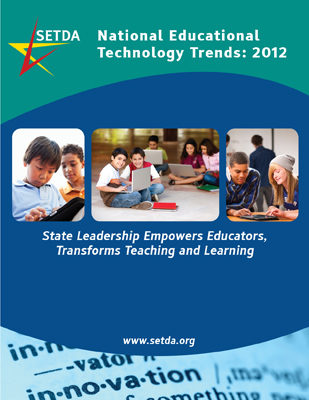
National Trends 2012
The 2012 National Trends report is a one-of- a-kind report that provides unique details related to state level educational technology initiatives

The 2012 National Trends report is a one-of- a-kind report that provides unique details related to state level educational technology initiatives

Many teachers and school districts publish their lesson plans and other materials. A high quality source for OER materials and tips and hints on how to use them is Karen Fasimpaur. Karen is a self-described learner, educator, reader, writer, open ed evangelist, and online community organizer.
The definitive source for information on CC licenses is the Creative Commons, a nonprofit whose mission is addressing the legal issues of making content on the internet open so that people can use it as they wish for education, research, and other purposes.
The flexible format of online learning gives it the potential to support all levels of student learning. This article was written by Kathleen L. Webb, SETDA member and Principal of the Utah Electronic High School and Utah’s State Educational Technology Coordinator.
An innovative model gives districts access to–and funding for–online courses to meet the challenge of rigorous state graduation requirements. This article was written by Barbara Smith, Texas Virtual School Project Director.
When Vermont educators began to see a gap between students’ needs and the state’s education system, they began planning how to adapt for the 21st century. This article was written by Peter Drescher, SETDA member and Vermont Education Technology Coordinator.
Teachers and administrators in Nevada began using a collaborative, online professional development system to facilitate their own 21st century learning. This article was written by Kimberly Vidoni, Shawn Lady, Loretta Asay, and Jacque Ewing-Taylor.
Indiana Educators Share Their Experience of Replacing Math Textbooks with Digital Materials. This article was written by Zach Foughty and John Keller, SETDA member and Director of Learning Technologies.
Meet the challenge of observing teachers who use innovative technology in their classrooms. This article was written by Monica Beglau, SETDA member and Executive Director of the eMINTS National Center at the University of Missouri.